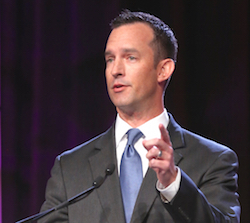
Assisted living communities and nursing homes face a potential “dramatic increase” in cases of COVID-19 as states continue to reopen and personal protective equipment shortages and testing delays persist, the American Health Care Association / National Center for Assisted Living warned Tuesday in a letter addressed to the National Governors Association and state governors.

AHCA / NCAL President and CEO Mark Parkinson and NCAL Executive Director Scott Tittle pointed to recent independent research by Harvard Medical School, Brown University’s School of Public Health and the University of Chicago showing that the intensity of COVID-19 outbreaks in nursing homes mirrors the rate of spread among the general population. These findings are consistent with AHCA / NCAL’s research examining similar data from the Centers for Medicare & Medicaid Services on outbreaks in nursing homes, they said.
Reopening senior living communities and skilled nursing facilities is important to residents’ well-being, Parkinson and Tittle said, but they called on federal and state public health agencies to provide additional support to protect residents and caregivers.

“Nursing homes and assisted living communities cannot stop the virus by ourselves — not without testing, PPE, staff support and funding, and not without support from the public health sector,” they wrote.
Governors, AHCA / NCAL said, should give “urgent attention” by taking three specific actions:
- Direct state public health agencies to expedite lab processing time and a solution for on-site testing with reliable and rapid results. A recent AHCA / NCAL survey found that lab processing and cost were the top barriers for access to testing.
- Direct state public health agencies to provide additional support on PPE supplies, especially N-95 masks. More than half of assisted living communities have less than a two-week supply of masks and gowns.
- Direct state public health agencies to work in close coordination with long-term care providers on reopening communities to visitation.
Parkinson and Tittle applauded states that have worked with providers “in taking a thoughtful approach to reopening facilities” with strategies including prioritizing long-term care for PPE; ensuring screening and monitoring of residents, staff and visitors; and resuming group activities, including outdoor visitation, with caution and limiting visitors.
“We urge governors and state health departments to closely monitor the situation in the general population county by county to determine if long-term care facilities need additional resources, and if visitations should be halted temporarily for the safety of residents and healthcare workers,” the letter stated.
In related news, the Centers for Medicare & Medicaid Services announced on Tuesday that “every single” nursing home across the country will be given “point-of-care” COVID-19 tests by the Trump administration starting next week.
The announcement does not apply to assisted living, but Parkinson used the occasion to say that regular testing of assisted living community and nursing home staff members “is not effective without obtaining timely test results. For nursing homes and assisted living communities to protect residents and staff, we need on-site testing with reliable and rapid results.”
He also reiterated the need for additional PPE and staffing in assisted living and skilled nursing.
In other coronavirus-related news:
- LeadingAge used the occasion of Vice President Mike Pence’s visit to Louisiana to call for “real leadership, clear-eyed assessments of testing capacity and resource access, and a coordinated national plan to ensure older adults and their care workers are at the front of the line for resources and support.” Workers, LeadingAge President and CEO Katie Smith Sloan said in a statement, “need ample PPE; sufficient testing supplies and rapid-results; funding and support to cover the extraordinary costs incurred as a result of this public health crisis; and pandemic hero pay, paid sick leave and other benefits for front line staff who care for older adults.”
- Iowa Rep. Cindy Axne (IA-03) is asking Gov. Kim Reynolds for a mobile TestIowa option for seniors and others in independent living, assisted living and other congregate living settings for COVID-19 testing. She also wants to increase the number of tests provided to these facilities for residents and staff, along with weekly data on cases in these facilities.
- A Florida assisted living facility has been closed to new residents after officials reported staff were failing to properly treat and care for COVID-19-positive residents. Alafia Village was ordered to stop accepting new residents by the Florida Agency for Health Care Administration for demonstrating “an inability or unwillingness to implement proactive action to protect residents, staff and third parties” from the novel coronavirus.
- Residents from an Amity Township, PA, independent living community bagged more than 2,000 Lifesavers for distribution to essential workers of local businesses. Several dozen residents from Keystone Villa worked on the kits in their apartments under social distancing guidelines. The Lifesavers Project was a collaborative idea by residents and management staff.
- Friendship Village dining staffers are getting as many as three times the recommended 10,000 steps per day just by doing their jobs during the COVID-19 lockdown. Servers in the life plan community have competitions to see who can clock the most steps while they provide “room service” to their residents who would otherwise visit the facility’s five-star quality restaurants.
- COVID-19 has shined a harsh light on America’s long-term care challenges, including highlighting the need for federal long-term care insurance. Most older adults can’t pay the average $100,000 a year for a nursing home, $50,000 for in-home care or $45,000 for assisted living, according to one media outlet.
- The Pima Love Note project is sending hand-colored pictures, cards and letters to assisted living and other long-term care residents to show they are not forgotten during COVID-19 visitor restrictions. Fifty-five facilities have signed up for the program through the Pima County Emergency Operations Center in Tucson, AZ.




